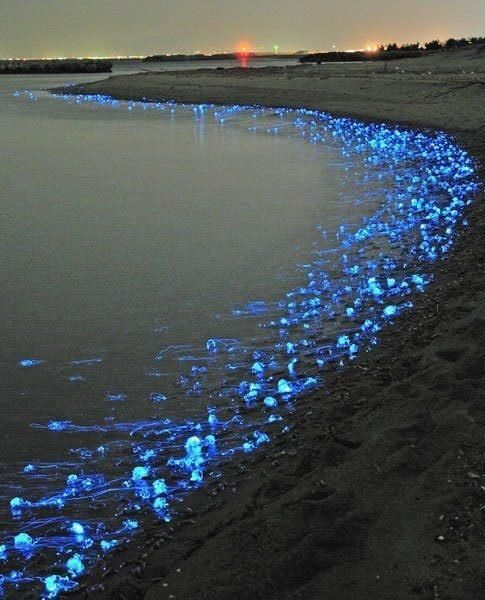Pretty bloody amazing...

"This is a picture of Sparkling Enope squid (also known as the flirefly squid) at Toyama Bay, Japan.
They are about 15.24 cm (roughly 6 inches) and die after only one year of life. Found in the Western Pacific ocean, they live at depths of 183-366 meters and only comes up to the surface at night to show off their brilliant bioluminescence. The photophores, the organs that produce the light, are located at the end of each tentacle.
Interesting fact about the Sparkling Enope squid: they are only species of cephalopod that have evolved to be able to see colour in three visual pigments. Scientists think that this is to help them distinguish between ambient light and their own bioluminescence. The firefly squid lights up for two reasons: the lights on the tentacle can flash to attract fish that the squid feed on and the squid can light up its entire body to attract a mate during the months of March to June."
Pic is from about the only decent thing I've ever come across on Facebook: http://www.facebook.com/IFeakingLoveScience , well worth a "like" for lots more fascinating and amazing pics

"This is a picture of Sparkling Enope squid (also known as the flirefly squid) at Toyama Bay, Japan.
They are about 15.24 cm (roughly 6 inches) and die after only one year of life. Found in the Western Pacific ocean, they live at depths of 183-366 meters and only comes up to the surface at night to show off their brilliant bioluminescence. The photophores, the organs that produce the light, are located at the end of each tentacle.
Interesting fact about the Sparkling Enope squid: they are only species of cephalopod that have evolved to be able to see colour in three visual pigments. Scientists think that this is to help them distinguish between ambient light and their own bioluminescence. The firefly squid lights up for two reasons: the lights on the tentacle can flash to attract fish that the squid feed on and the squid can light up its entire body to attract a mate during the months of March to June."
Pic is from about the only decent thing I've ever come across on Facebook: http://www.facebook.com/IFeakingLoveScience , well worth a "like" for lots more fascinating and amazing pics


 amazing pic as well
amazing pic as well  Light travels faster than sound. This is why some people appear bright until you hear them speak.
Light travels faster than sound. This is why some people appear bright until you hear them speak.
Comment